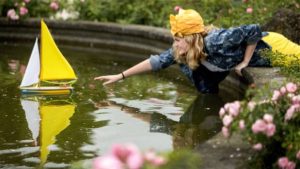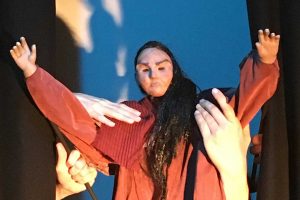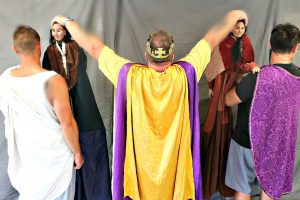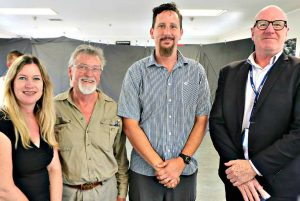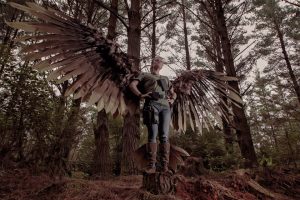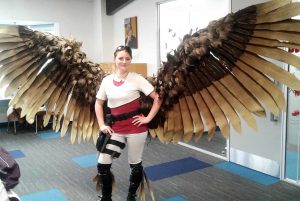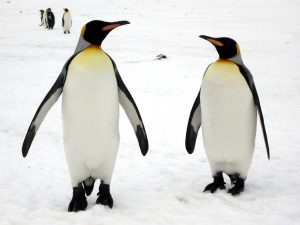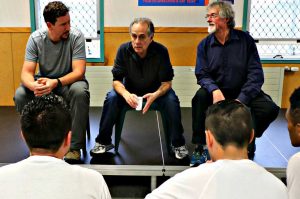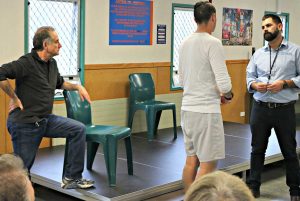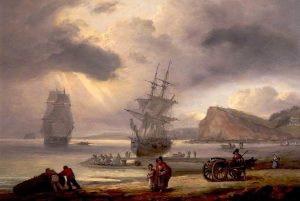 The book explores the perils and challenges faced by four British women writers of the Romantic period who ventured from home to embrace the world at large. Frowned on socially for stepping out, these unconventional women encountered and were influenced by the turbulence of the times, from the effects of the French Revolution to the uncertainties of juggling writing, motherhood, love, debt and the desire for independence.
The book explores the perils and challenges faced by four British women writers of the Romantic period who ventured from home to embrace the world at large. Frowned on socially for stepping out, these unconventional women encountered and were influenced by the turbulence of the times, from the effects of the French Revolution to the uncertainties of juggling writing, motherhood, love, debt and the desire for independence.
Dr Horrocks, based in the School of English and Media Studies on the Wellington campus, shares insights on writing the book, on the deeper implications of travel for women – then and now – and evolutions in ‘mobility studies’.
How did the idea for this book come about?
When I was doing my PhD at Princeton University, I was studying women writers from the late 18th century and Romantic period and was amazed by the richness and strangeness of their books. I was also acutely homesick and what I saw everywhere – in novels, poetry, and travel books – was uprooted-ness, and homelessness. There seemed to be vagrants, refugees, orphans, unmarried mothers without secure lodgings, feminists abandoned by their lovers in everything I read. The working title for the first version of the project was ‘Reluctant Wanderers’.
What particularly interested me was how radically different this was from how I’d been taught to think about movement and travel – both in my own life and in literature. Travel was meant to be about going out into the world, discovering oneself, and returning home victorious, somehow both wiser and better.
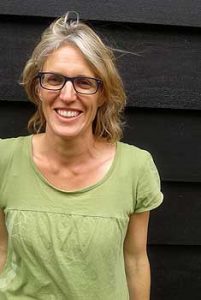 But mobility looked completely different in these texts. I became interested in unpicking influential ideologies that have taught us to see mobility as ‘freedom’ and, as a result, have obscured all the ways in which mobility can be painful, difficult, and continuous for some. My book looks at the ways writers sought to evoke what this feeling of economic and emotional insecurity feels like, in particular for women on the move. I see this as speaking directly into our current historical moment too.
But mobility looked completely different in these texts. I became interested in unpicking influential ideologies that have taught us to see mobility as ‘freedom’ and, as a result, have obscured all the ways in which mobility can be painful, difficult, and continuous for some. My book looks at the ways writers sought to evoke what this feeling of economic and emotional insecurity feels like, in particular for women on the move. I see this as speaking directly into our current historical moment too.
Who are the four women writers you focus on, and why did you choose them?
The four key British women writers I focus on are Charlotte Smith, Ann Radcliffe, Mary Wollstonecraft, and Frances Burney. I was interested in how ‘wandering’ disrupted different genres, so each chapter in the book is about a woman author working in a particular literary form. These writers are now at the centre of the new Romantic canon.
Charlotte Smith was a novelist and poet who started writing in debtors’ prison when she was 25 and had nine living children. The obvious fix for her financial woes, of course, was to begin writing poetry! Astonishingly, she managed to support her family by writing for the rest of her life. Her friend, the poet William Cowper, described her as “chained to her desk like a slave to his oar”.
As she was shunted from one temporary lodging to the next, Smith wrote about wanderers of all sorts, using her own experience to write about displacements. One of her poems I write about is an amazing long blank verse poem, The Emigrants, which explores what our material and ethical responsibilities are toward refugees. The refugees Smith [whose poetry was launched in a new edition co-edited by Dr Horrocks and published by Broadview Press last month] was writing about were those displaced by the French Revolution, who arrived by the thousands on Britain’s south coast in the bitter winter of 1792-1793, often in open boats and with nothing but the clothes they wore.
Ann Radcliffe is the mother of the Gothic novel – I was interested in what happened if we considered gothic heroines as the most coerced of wanderers.
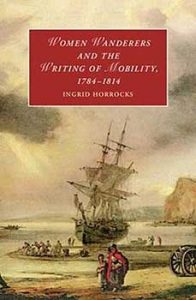 Pioneering feminist Mary Wollstonecraft is probably the most well-known author I write about. She felt endlessly homeless as an intellectual woman in her society. She’s best known for her ground-breaking work The Rights of Woman, but her most moving work is a beautiful travel book she wrote about a journey she took through Scandinavia with her baby in 1796. She’d been disappointed in the French Revolution, which she’d hoped would change women’s situation, and she’d been abandoned by her American lover. It’s an intensely melancholy work.
Pioneering feminist Mary Wollstonecraft is probably the most well-known author I write about. She felt endlessly homeless as an intellectual woman in her society. She’s best known for her ground-breaking work The Rights of Woman, but her most moving work is a beautiful travel book she wrote about a journey she took through Scandinavia with her baby in 1796. She’d been disappointed in the French Revolution, which she’d hoped would change women’s situation, and she’d been abandoned by her American lover. It’s an intensely melancholy work.
What she evokes is a kind of deep homelessness – literal, political, emotional and aesthetic – associated with feeling out of joint with the time in which she was living. Wollstonecraft went on to marry the political philosopher William Godwin and died giving birth to Mary Shelley.
Frances Burney had become a literary sensation in the 1780s with a novel about London society life, and is probably the best-known novelist of the late eighteenth century. Her long, digressive final novel is called The Wanderer or Female Difficulties. It tells the story of a female refugee from the French Revolution trying to find work and safe, secure lodgings in a British society that can only see her as a foreigner and outcast.
What Burney’s wandering heroine finally sees is a strikingly unjust society, unable to see that people’s sufferings are not necessarily a result of their errors. She sees a society of “failure without fault; success without virtue; sickness without relief; oppression in the very face of liberty; labour without sustenance; and suffering without crime”. It’s an astonishingly modern novel.
In the time frame of your book, leisure travel/tourism was clearly not something women did easily, often, or independently – what motivated these women to travel?
Part of what I aimed to do in the book is to shift what we think of as travel and find ways of illuminating all kinds of movement. Part of what’s exciting about this is it makes visible the very many ways in which women have always been on the move. So, Wollstonecraft is really the only figure I look at who would conventionally be seen as a traveller. But even she wasn’t a leisure tourist. There’s an exciting backstory to her journey: she was on a business trip on behalf of her ex-lover to find a stolen ship filled with silver being smuggled out of Revolutionary France. Wollstonecraft was also travelling in the hope of writing a book out of the journey that would help to make her financially independent, which it did to some extent. There were other women travellers at the time, but no one quite like Wollstonecraft. She tended to break most rules for women of her day.
Other authors, poets, and characters I write about move out of necessity: those displaced in various ways by war, divorced mothers living in insecure, rented accommodation, and orphans whose guardians prey on rather than protect them. I’m interested in what happens when we pay attention to these everyday kinds of movements, rather than simply movement that can be more easily conceived of as ‘travel’.
This kind of shift in attention to the everyday is exactly what’s happening in scholarship on contemporary movement in the interdisciplinary field of what’s called ‘mobility studies’. Even in the travel writing course I teach we talk a lot about travel as not being necessarily about voluntary movement, but for many people something that is forced upon them. We’re also mobile every day, not simply when we’re on ‘holiday’.
What role did the French Revolution play in the lives and writings of the women in your book?
The French Revolution is central to the British writings of the turbulent 1790s. Mary Wollstonecraft and Charlotte Smith in particular were early public supporters of the Revolution. Wollstonecraft wrote the first extended British response, her Vindication of the Rights of Men, which she followed up a year later with Vindication of the Rights of Woman. The books I write about mainly come after the ‘Terror’ of the September massacres in France in 1792, and out of an immense sense of disappointment and loss in the hope many British radicals had placed in the Revolution, including in changing options for women.
Also, the 1790s, following the Revolution and the subsequent declaration of war between France and England, was a period of extreme social, political, and economic upheaval. In this decade literal wanderers, from discharged soldiers, to emigrants, to war widows, to the growing ranks of the homeless, became more literally visible. Literary texts that told stories of troubled wanderers at this time were in part simply seeking to respond to, and represent, this historical reality.
Do you draw parallels between then and now for women travel writers?
I don’t do this explicitly in this book. In a travel book I wrote some years ago – Travelling with Augusta, 1835 & 1999 (Victoria University Press) – I compared my own experience as a young woman abroad to that of a woman traveller in the early nineteenth century.
What I do see in this [latest] book are parallels between these women’s lives and the difficulty of voicing the specifics of their situations – something still very much with us today. For example, Wollstonecraft was fierce in her rejection of the notion that as a wandering, unmarried mother she should be treated as an object of pity. What she wanted to draw attention to, instead, were the systemic social conditions that led to situations like hers. I kept thinking of Wollstonecraft during the fallout from the Metiria Turei controversy during the election. Whatever you think about how this was handled, it was striking the extent to which her story was reduced to an individual, personalised story – which you could either pity of revile – and how difficult it was to hear the wider story of a social failure Turei had sought to highlight.
What do you mean [in your introduction] by the traveller as ‘the emblematic modern subject’?
We live in an era where millions are uprooted by war, economics and climate change and even those who are not obviously on the move are often still subject to conditions such as insecurity of housing or work. The traveller embodies this sense of unsettlement, making it easier for us to see it. What’s particularly illuminating about the Romantic period is that this is the moment when we begin to see what will become a radical shift toward thinking in terms of mobility. We begin to see an ideological shift toward seeing mobility as freedom, which is central to neoliberal thought in ways that obscures just how unequal the experience of mobility is.
What are you working on at the moment?
I’m writing about New Zealand literature currently – in particular how New Zealand has been imagined in contemporary nonfiction writing. And I’ve also been writing and reading about swimming, as an embodied way to think about movement and how to engage with a particular landscape. I’ve got a travel piece coming out in the next Landfall about swimming in some of our most polluted rivers.
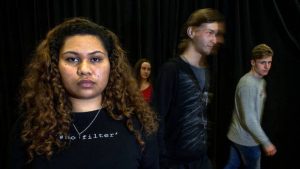 f Philomele, who was raped and silenced brutally by her brother-in-law Tereus.
f Philomele, who was raped and silenced brutally by her brother-in-law Tereus.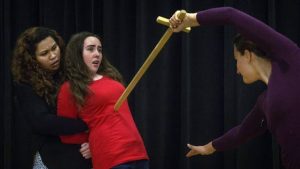 “The characters are always on stage watching in, like society watching the action unfold. They’re allowed to react accordingly,” Lenart said.
“The characters are always on stage watching in, like society watching the action unfold. They’re allowed to react accordingly,” Lenart said.